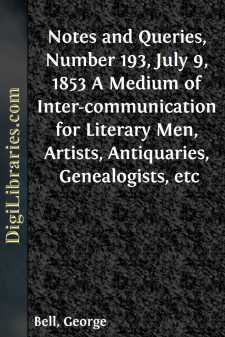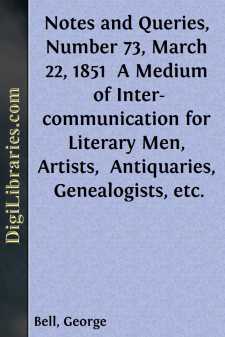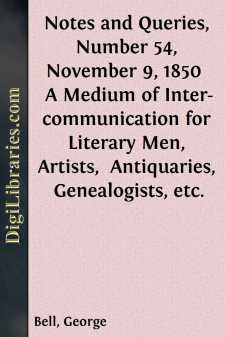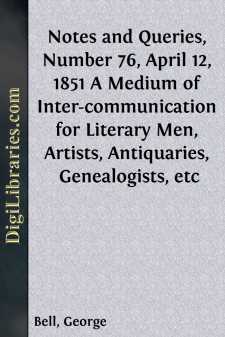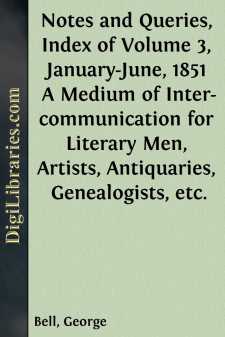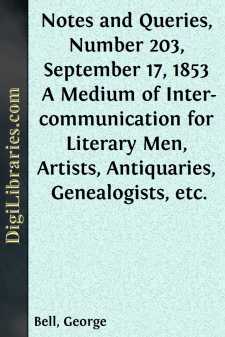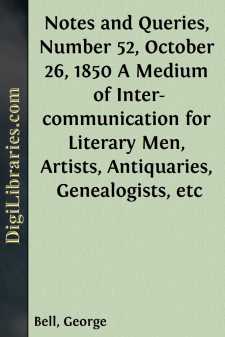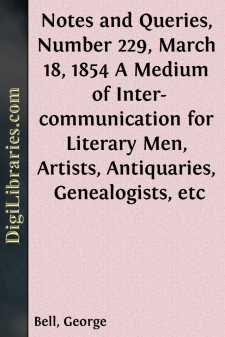Categories
- Antiques & Collectibles 13
- Architecture 36
- Art 48
- Bibles 22
- Biography & Autobiography 813
- Body, Mind & Spirit 142
- Business & Economics 28
- Children's Books 17
- Children's Fiction 14
- Computers 4
- Cooking 94
- Crafts & Hobbies 4
- Drama 346
- Education 46
- Family & Relationships 57
- Fiction 11829
- Games 19
- Gardening 17
- Health & Fitness 34
- History 1377
- House & Home 1
- Humor 147
- Juvenile Fiction 1873
- Juvenile Nonfiction 202
- Language Arts & Disciplines 88
- Law 16
- Literary Collections 686
- Literary Criticism 179
- Mathematics 13
- Medical 41
- Music 40
- Nature 179
- Non-Classifiable 1768
- Performing Arts 7
- Periodicals 1453
- Philosophy 64
- Photography 2
- Poetry 896
- Political Science 203
- Psychology 42
- Reference 154
- Religion 513
- Science 126
- Self-Help 84
- Social Science 81
- Sports & Recreation 34
- Study Aids 3
- Technology & Engineering 59
- Transportation 23
- Travel 463
- True Crime 29
Sort by:
by:
George Bell
"Sir,—Having once writt to you in my own Language, I continue to use the same Privilege. I am sorry that I am in no better a condition to acquit my self of my Promise to you. My Recovery has been so slow, that I am scarce yet got up: and I have been unable to hold any Correspondance with my Friends in Town. Mr. King promisd to send me the Papers I mention'd to you of Mr. Lock's; who, it...
more...
by:
George Bell
THE EYE: ITS PRIMARY IDEA. I do not remember to have remarked that any writer notices how uniformly, in almost all languages, the same primary idea has been attached to the eye. This universal consent is the more remarkable, inasmuch as the connexion in question, though of course most appropriate and significant in itself, hardly seems to indicate the most prominent characteristic, or what we should...
more...
by:
George Bell
SUGGESTIONS FOR PRESERVING A RECORD OF EXISTING MONUMENTS. When, in the opening Number of the present Volume (p. 14), we called the attention of our readers to the Monumentarium of Exeter Cathedral, we expressed a hope that the good services which Mr. Hewett had thereby rendered to all genealogical, antiquarian, and historical inquirers would be so obvious as to lead a number of labourers into the same...
more...
by:
George Bell
ENGLISH AND NORMAN SONGS OF THE FOURTEENTH CENTURY. In a vellum book, known as The Red Book of Ossory, and preserved in the archives of that see, is contained a collection of Latin religious poetry, written in a good bold hand of the 14th century; prefixed to several of the hymns, in a contemporary and identical hand, are sometimes one sometimes more lines of a song in old English or Norman French,...
more...
by:
George Bell
To judge of this question fairly, it will be necessary to cite the passage in which it occurs, as it stands in the folio, Act III. Sc. 8., somewhat at large. "Eno. Naught, naught, all naught! I can behold no longer; Th' Antoniad, the Egyptian admiral, With all their sixty, fly, and turn the rudder; To see't, mine eyes are blasted. Enter Scarus. Scar. Gods and goddesses, all the whole...
more...
by:
George Bell
No description available
by:
George Bell
OUR SHAKSPEARIAN CORRESPONDENCE. We have received from a valued and kind correspondent (not one of those emphatically good-natured friends so wittily described by Sheridan) the following temperate remonstrance against the tone which has distinguished several of our recent articles on Shakspeare:— Shakspeare Suggestions (Vol. viii., pp. 124. 169.).— "Most busy, when least I do." I am...
more...
by:
George Bell
ADDRESS TO OUR FRIENDS. We this day publish our fifty-second Number. Every Saturday, for twelve months, have we presented to our subscribers our weekly budget of "Notes," "Queries," and "Replies;" and in so doing, we trust, we have accomplished some important ends. We have both amused and instructed the general reader; we have stored up much curious knowledge for the use of...
more...
by:
George Bell
GOSSIPING HISTORY. "This is the Jew That Shakspeare drew." I do not know by whom or when the above couplet was first imputed to Pope. The following extracts will show how a story grows, and the parasites which, under unwholesome cultivation, adhere to it. The restoration of Shakspeare's text, and the performance of Shylock as a serious part, are told as usual. "In the dumb action of...
more...
by:
George Bell
LORD HALIFAX AND MRS. CATHERINE BARTON. Those who have written on the life of Newton have touched with the utmost reserve upon the connexion which existed between his half-niece Catherine Barton, and his friend Charles Montague, who died Earl of Halifax. They seem as if they were afraid that, by going fairly into the matter, they should find something they would rather not tell. The consequence is,...
more...



